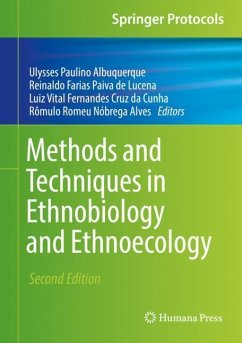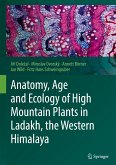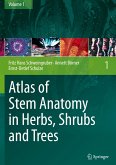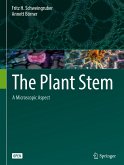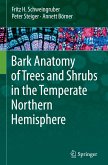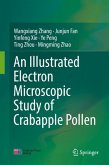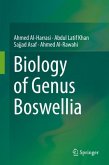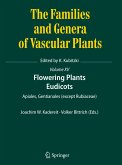Methods and Techniques in Ethnobiology and Ethnoecology
Herausgegeben:Albuquerque, Ulysses Paulino; de Lucena, Reinaldo Farias Paiva; Cruz da Cunha, Luiz Vital Fernandes; Alves, Rômulo Romeu Nóbrega
Methods and Techniques in Ethnobiology and Ethnoecology
Herausgegeben:Albuquerque, Ulysses Paulino; de Lucena, Reinaldo Farias Paiva; Cruz da Cunha, Luiz Vital Fernandes; Alves, Rômulo Romeu Nóbrega
- Gebundenes Buch
- Merkliste
- Auf die Merkliste
- Bewerten Bewerten
- Teilen
- Produkt teilen
- Produkterinnerung
- Produkterinnerung
Ethnobiology and ethnoecology have become very popular in recent years. Particularly in the last 20 years, many manuals of methods have published the most classical approaches to the subject. There have been, however, many advances in research as a result of interaction with different disciplines, but also due to more recent results, new original and interesting questions.
This handbook provides the current state of the art methods and techniques in ethnobiology and ethnoecology, and related fields. This new volume, besides bringing new and original aspects of what is found in the…mehr
Andere Kunden interessierten sich auch für
![Anatomy, Age and Ecology of High Mountain Plants in Ladakh, the Western Himalaya Anatomy, Age and Ecology of High Mountain Plants in Ladakh, the Western Himalaya]() Jirí DolezalAnatomy, Age and Ecology of High Mountain Plants in Ladakh, the Western Himalaya192,99 €
Jirí DolezalAnatomy, Age and Ecology of High Mountain Plants in Ladakh, the Western Himalaya192,99 €![Atlas of Stem Anatomy in Herbs, Shrubs and Trees Atlas of Stem Anatomy in Herbs, Shrubs and Trees]() Fritz Hans SchweingruberAtlas of Stem Anatomy in Herbs, Shrubs and Trees109,99 €
Fritz Hans SchweingruberAtlas of Stem Anatomy in Herbs, Shrubs and Trees109,99 €![The Plant Stem The Plant Stem]() Fritz H. SchweingruberThe Plant Stem38,99 €
Fritz H. SchweingruberThe Plant Stem38,99 €![Bark Anatomy of Trees and Shrubs in the Temperate Northern Hemisphere Bark Anatomy of Trees and Shrubs in the Temperate Northern Hemisphere]() Fritz H. SchweingruberBark Anatomy of Trees and Shrubs in the Temperate Northern Hemisphere134,99 €
Fritz H. SchweingruberBark Anatomy of Trees and Shrubs in the Temperate Northern Hemisphere134,99 €![An Illustrated Electron Microscopic Study of Crabapple Pollen An Illustrated Electron Microscopic Study of Crabapple Pollen]() Wangxiang ZhangAn Illustrated Electron Microscopic Study of Crabapple Pollen76,99 €
Wangxiang ZhangAn Illustrated Electron Microscopic Study of Crabapple Pollen76,99 €![Biology of Genus Boswellia Biology of Genus Boswellia]() Ahmed Al-HarrasiBiology of Genus Boswellia112,99 €
Ahmed Al-HarrasiBiology of Genus Boswellia112,99 €![Flowering Plants. Eudicots Flowering Plants. Eudicots]() Flowering Plants. Eudicots165,99 €
Flowering Plants. Eudicots165,99 €-
-
-
Ethnobiology and ethnoecology have become very popular in recent years. Particularly in the last 20 years, many manuals of methods have published the most classical approaches to the subject. There have been, however, many advances in research as a result of interaction with different disciplines, but also due to more recent results, new original and interesting questions.
This handbook provides the current state of the art methods and techniques in ethnobiology and ethnoecology, and related fields. This new volume, besides bringing new and original aspects of what is found in the literature, fills some of the gaps in volume one by including the most systematic and extensive treatment of methods and techniques in qualitative research. Along with the various methods covered in the individual chapters, the handbook also includes an extensive bibliography that details the current literature in the field.
This handbook provides the current state of the art methods and techniques in ethnobiology and ethnoecology, and related fields. This new volume, besides bringing new and original aspects of what is found in the literature, fills some of the gaps in volume one by including the most systematic and extensive treatment of methods and techniques in qualitative research. Along with the various methods covered in the individual chapters, the handbook also includes an extensive bibliography that details the current literature in the field.
Produktdetails
- Produktdetails
- Springer Protocols Handbooks
- Verlag: Humana / Springer New York / Springer, Berlin
- Artikelnr. des Verlages: 978-1-4939-8918-8
- 2. Aufl.
- Seitenzahl: 360
- Erscheinungstermin: 13. November 2018
- Englisch
- Abmessung: 260mm x 183mm x 25mm
- Gewicht: 844g
- ISBN-13: 9781493989188
- ISBN-10: 1493989189
- Artikelnr.: 53470634
- Herstellerkennzeichnung
- Springer-Verlag GmbH
- Tiergartenstr. 17
- 69121 Heidelberg
- ProductSafety@springernature.com
- Springer Protocols Handbooks
- Verlag: Humana / Springer New York / Springer, Berlin
- Artikelnr. des Verlages: 978-1-4939-8918-8
- 2. Aufl.
- Seitenzahl: 360
- Erscheinungstermin: 13. November 2018
- Englisch
- Abmessung: 260mm x 183mm x 25mm
- Gewicht: 844g
- ISBN-13: 9781493989188
- ISBN-10: 1493989189
- Artikelnr.: 53470634
- Herstellerkennzeichnung
- Springer-Verlag GmbH
- Tiergartenstr. 17
- 69121 Heidelberg
- ProductSafety@springernature.com
Ulysses Paulino Albuquerque is graduate at Biological Sciences from Universidade Federal de Pernambuco, master's at Plant Biology (Taxonomy and Ethnobotany) from Universidade Federal de Pernambuco and PhD at Plant Biology (Ethnobotany) from Universidade Federal de Pernambuco. Currently he is professor of Universidade Federal de Pernambuco (Pernambuco, Northeastern Brazil) where he coordinates the Laboratory of Ecology and Evolution of Social-Ecological Systems (LEA). He acts in the areas of ecological anthropology, ethnobotany, biodiversity conservation, applied botany, ethnopharmacology and natural products. He has a special interest to the comprehension of the factors that modulate the relation between people and biota on the interface of ecology and evolutive processes. He is member of editorial board of the Journal of Ethnobiology and Etnomedicine (Associate Editor), Economic Botany (Associate Editor) and Ethnobiology and Conservation (co-Editor in Chief). Reinaldo Farias Paiva Lucena is graduate at Biological Sciences from Universidade Estadual da Paraiba, master's and PhD at botany from Universidade Federal Rural de Pernambuco. Currently he is professor of Universidade Federal da Paraiba (Northeastern Brazil). He acts in the areas of ethnobotany and environmental sciences. Luiz Vital Fernandes Cruz da Cunha is graduate at Biological Sciences from Universidade Católica de Pernambuco, master's in plant biology at Universidade Federal de Pernambuco and PhD at Forest Sciences from Universidade Federal Rural de Pernambuco. Currently he is professor of Universidade Católica de Pernambuco (Northeastern Brazil), were acts as director of the Institue of Health and Biological Sciences. Rômulo R.N. Alves is graduate at Biological Sciences from Universidade federal da Paraiba, master`s and PhD at Zoology from Universidade Federal da Paraiba. Currently he is professor of Universidade Estadual da Paraiba (Northeastern Brazil). His areas of academic interest are ethnozoology and wildlife trade, uses and conservation, zootherapy, and human ecology. He has conducted ethnobiological research for the last ten years, which focuses on ethnozoology, particularly on fisheries, hunting, and wildlife trade and uses. In addition, he is one of the Editors-in-Chief of the journal Ethnobiology and Conservation and member of the Editorial Board of the Journal of Ethnobiology and Ethnomedicine.
Preface.- Overview.- Preparation of qualitative research.- Execution of the qualitative research.- Participant observation and Field Journal.- Audio and video recording techniques for ethnobiological research.- Discourse of the collective subject as a method for analysis of data in ethnobiological research.- Qualitative data analysis.- The meta-analytical and macroecological approach of Ethnobiology.- Collection and analysis of risks associated with environmental changes.- Sensitivity to harvesting and local risk indexes in ethnobotanical research.- The use of multivariate tools in the study of traditional resource management systems.- Multidimensional analysis for testing conservation, ecological and ethnobiological hypotheses.- Ethnoecology in pluricultural contexts.- Ethnobotany and ethnoecology applied to historical ecology.- Biocultural collections.- Accessing the traditional knowledge on the use of cryptogams.- Ethical considerations and protocols in ethnoecological and ethnobiological research.- Challenges in ethnozoological research.- Methodology applied to geographical indication.- Recent advances in research methods and techniques.- Chemical profile and antioxidant activity of natural products.-Collection and extraction of fatty acids from animals and their possible applications in ethnopharmacological research.- Advanced methods in the chemical analysis of medicinal plants.- Population ecology of plant species submitted to extractivism.- Methods for measuring hunting pressure.- Rapid sampling techniques for vertebrate fauna.- Techniques for analyzing the sustainability of hunting.- Description of technological processes for optimization and enhancement of local uses.- Index.
Preface.- Overview.- Preparation of qualitative research.- Execution of the qualitative research.- Participant observation and Field Journal.- Audio and video recording techniques for ethnobiological research.- Discourse of the collective subject as a method for analysis of data in ethnobiological research.- Qualitative data analysis.- The meta-analytical and macroecological approach of Ethnobiology.- Collection and analysis of risks associated with environmental changes.- Sensitivity to harvesting and local risk indexes in ethnobotanical research.- The use of multivariate tools in the study of traditional resource management systems.- Multidimensional analysis for testing conservation, ecological and ethnobiological hypotheses.- Ethnoecology in pluricultural contexts.- Ethnobotany and ethnoecology applied to historical ecology.- Biocultural collections.- Accessing the traditional knowledge on the use of cryptogams.- Ethical considerations and protocols in ethnoecological and ethnobiological research.- Challenges in ethnozoological research.- Methodology applied to geographical indication.- Recent advances in research methods and techniques.- Chemical profile and antioxidant activity of natural products.-Collection and extraction of fatty acids from animals and their possible applications in ethnopharmacological research.- Advanced methods in the chemical analysis of medicinal plants.- Population ecology of plant species submitted to extractivism.- Methods for measuring hunting pressure.- Rapid sampling techniques for vertebrate fauna.- Techniques for analyzing the sustainability of hunting.- Description of technological processes for optimization and enhancement of local uses.- Index.

